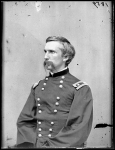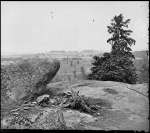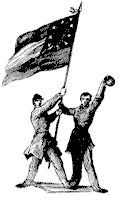|
||
|
|
||
|
Lawrence Chamberlain was born September 8, 1828 in a cottage near Brewer, Maine; a farming and shipbuilding community. He was named after James Lawrence who said the famous words “don't give up the ship.” He was the eldest of five children who were raised on good manners and cheerfulness. As a boy he loved the outdoors and as a adolescence loved school and mathematics and reading. When he was with his father he learned many lessons such as how to have sheer willpower and a positive attitude that would later help him in life. |
||
|
|
||
|
In 1855 he became engaged to priest daughter at a local church named Caroline Fanny Adames. Not long after they met he graduated from Bowdoin College, Phi Betta Kappa with a bachelors degree. It was not until late 1855 they would get married. In 1856 he was elected chair of modern languages and professor of rhetoric and oratory. While being a professor in his early years he was blessed by god with his first two children.
|
||
|
In 1861 with the outbreak of the war he was granted by the college a two-year leave and decided to serve his country and to join the war as a Lieutenant Colonel of the 20th Maine Infantry. As a trainee at a camp he observed many lessons about soldiering and being in charge of a regiment. He also witnessed the transformation of more than 900 unskilled men into soldiers. The first order for the new Lieutenant was to travel to Antietam, the bloodiest battle of all time, but luckily they wouldn't fight until halfway through the battle. Their second battle would be “The Battle of Fredricksburg” one in which he was shot for the first in the neck and in the ear, but months later would make a remarkable comeback. |
||
|
In the Battle at Gettysburg, which would prove to be his finest hour and battle, he was ranked a general. On July 2, 1863 his 20th Maine Infantry was positioned at the far left of the line on “Little Round Top”. In a Confederate to claim “Little Round Top” General John Bell Hood tried to advance up a rocky hill. In a counterattack Chamberlain's infantry charged down the hill while Chamberlain himself held the top of “Little Round Top.” He would many years later receive many honors for his heroics including a medal of honor. Not long after Gettysburg he was sent to the “Battle of Spotsylvania” the last time he would command the 20th Maine Infantry another victory. The fourth war he would fight in was "The Battle Petersburg" where he was shot with the a minee ball again he soon recovered. In 1865 he was sent to Quaker Ridge and was shot in the arm. On April 9, 1865 Chamberlain was called on by Grant to receive the formal surrender of arms and colors of Lee's Confederate army at Appomattox Courthouse. At Appomattox he was reunited for the first time with his old 20th Maine Infantry. Years later after the war in 1866 he became a professor at Bowdein College. In 1871 he got into politics and was elected governor of Maine where he completed his four terms. On February 24, 1914 Joshua Lawrence Chamberlain passed away from an ancient gunshot wound that was believed he received at Petersburg. He was 86 years old. Interesting Facts:
|




